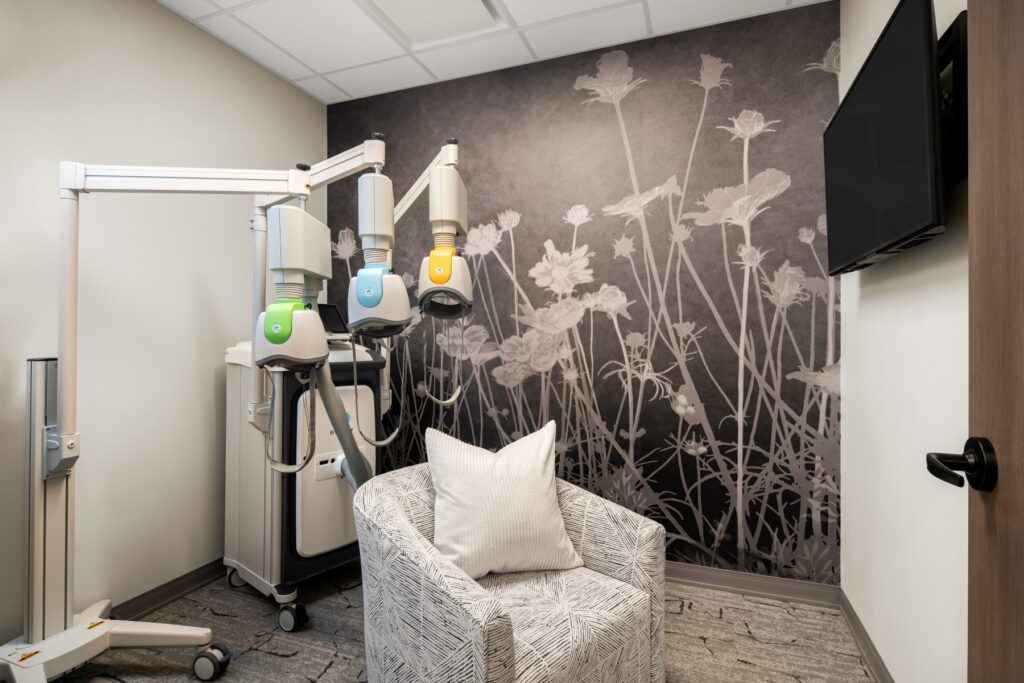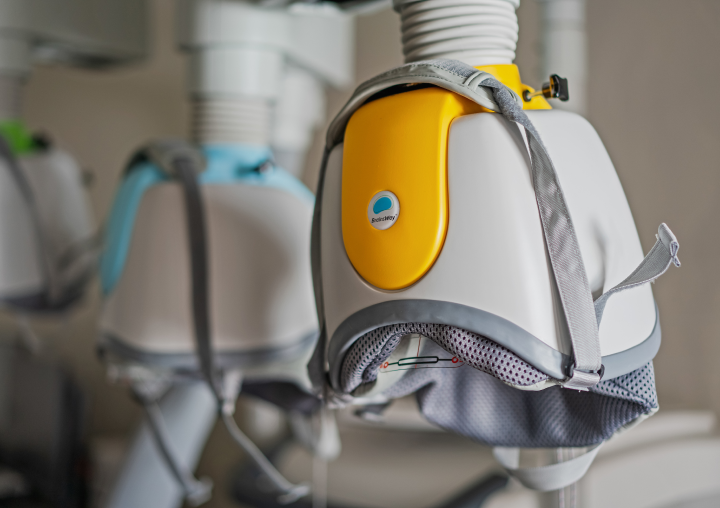Deep Transcranial Magnetic Stimulation (Deep TMS)

Dive deeper into your mental health recovery with Deep Transcranial Magnetic Stimulation (Deep TMS), available as an add-on modality at Amend. This FDA-approved, non-invasive, innovative treatment targets the neurological roots of Obsessive-Compulsive Disorder (OCD), Major Depressive Disorder (MDD), and aids in smoking cessation, marking a significant advancement in non-invasive therapy options.
Enhance Your Path to Wellness with Deep TMS During Residential Treatment
Deep TMS, utilizing Brainsway’s pioneering technology, uses magnetic fields to modulate the neural activity of brain regions implicated in OCD, MDD, and addiction, providing:
- Targeted Impact: Brainsway’s Deep TMS technology is engineered to reach deeper brain regions with precision, offering a more effective treatment for conditions like OCD and MDD compared to traditional TMS (Levkovitz et al., 2015; Carmi et al., 2019).
- Clinically Validated Safety: The FDA has endorsed Deep TMS for its safety and efficacy in treating MDD and OCD, presenting it as a viable non-medication treatment option (FDA, 2018).
- Evidence-Based Results: Research underscores Deep TMS’s capacity to significantly alleviate symptoms of depression, OCD, and nicotine addiction, fostering a new beginning for individuals (Carmi et al., 2019; Dinur-Klein et al., 2014).
Personalized Treatment Experience with Deep TMS
Our Deep TMS therapy is characterized by its client-centric approach, ensuring comfort and efficacy:
- Painless Procedure: Each session, lasting about 20 minutes, involves wearing a Brainsway helmet to deliver therapeutic magnetic pulses, without pain or the need for anesthesia. Many clients describe the treatment as a tapping sensation.
- Customized Care: Tailoring treatment to your specific needs, we maximize the therapeutic benefits by adapting the protocol to your brain’s unique patterns. Three different helmets are available to target the condition of your choice.
- Progress Tracking: Continuous evaluation of your response to treatment enables the TMS specialists to fine-tune the approach, ensuring the best possible outcomes.
Grounded in Research: The Science Behind Deep TMS
The effectiveness of Deep TMS for depression, OCD, and smoking cessation is supported by robust scientific evidence:
- MDD Relief: A pivotal study by Levkovitz et al. (2015) demonstrated significant reductions in depressive symptoms among clients receiving Deep TMS, highlighting its potential as a transformative treatment for depression.
- OCD Improvements: Research by Carmi et al. (2019) found that Deep TMS notably reduced OCD symptoms, marking a breakthrough in the treatment of this challenging condition.
- Aiding Smoking Cessation: Dinur-Klein et al. (2014) reported that Deep TMS significantly reduced cravings and nicotine consumption, offering hope for those struggling to quit smoking.
Benefits of Deep TMS: Beyond Symptom Reduction
Deep TMS not only reduces symptoms of depression, OCD, and but also enhances overall mental health:
- Comprehensive Symptom Management: Studies have shown Deep TMS’s efficacy in reducing symptoms across MDD, OCD, and aiding smoking cessation, with significant improvements in quality of life (Carmi et al., 2019; Dinur-Klein et al., 2014).
- Cognitive and Emotional Gains: Participants in Deep TMS studies have reported enhanced cognitive functions and emotional well-being, contributing to a more fulfilled life (Levkovitz et al., 2015).
- Lasting Effects: The benefits of Deep TMS have been shown to endure beyond the treatment period, providing a long-term impact on mental health stability (Tendler et al., 2021).
Considerations and Side Effects of Deep TMS
While Deep TMS is generally well-tolerated, some individuals may experience temporary side effects such as headaches or scalp discomfort. Dedicated TMS providers are committed to providing the highest level of care, ensuring any side effects are managed effectively.

Your Journey with Deep TMS During Residential Treatment
Amend Treatment integrates Deep TMS within its holistic treatment philosophy as an additional option for eligible clients, offering this state-of-the-art technology as an adjunctive part of a comprehensive recovery plan. Deep TMS represents another step forward in our commitment to providing innovative and effective mental health solutions. Depending on your conditions, history, and insurance provider, Deep TMS may be covered by insurance during your stay or may be available for an à la carte self-pay price.
Embark on a Transformative Journey with Amend
Begin your transformative journey with best-in-class residential treatment in Malibu by reaching out for a confidential consultation today. Our team is ready to guide you through the process and help determine if Deep TMS is the right choice for you during your stay. Reach out at (866) 875-3411, or submit your insurance information for a free benefits verification.
Want More Information?
Making informed decisions about your mental health treatment is essential. Our team is here to provide you with detailed information about Deep TMS and how it can fit into your personalized residential treatment plan. At Amend Treatment, we’re dedicated to supporting your journey towards lasting wellness and recovery.
Content References
- Carmi, L., Tendler, A., Bystritsky, A., Hollander, E., Blumberger, D. M., Daskalakis, Z., & Feifel, D. (2019). Efficacy and Safety of Deep Transcranial Magnetic Stimulation for Obsessive-Compulsive Disorder: A Prospective Multicenter Randomized Double-Blind Placebo-Controlled Trial. The American Journal of Psychiatry, 176(11), 931-938.
- Dinur-Klein, L., Dannon, P., Hadar, A., Rosenberg, O., Roth, Y., Kotler, M., & Zangen, A. (2014). Smoking cessation induced by deep repetitive transcranial magnetic stimulation of the prefrontal and insular cortices: a prospective, randomized controlled trial. Biological Psychiatry, 76(9), 742-749.
- FDA (2018). FDA permits marketing of transcranial magnetic stimulation for treatment of obsessive compulsive disorder. U.S. Food and Drug Administration.
- Levkovitz, Y., Harel, E. V., Roth, Y., Braw, Y., Most, D., Katz, L. N., … & Zangen, A. (2015). Deep transcranial magnetic stimulation over the prefrontal cortex: Evaluation of antidepressant and cognitive effects in depressive patients. Brain Stimulation, 8(4), 547-556.
- Tendler, A., Sisko, E., Barnea-Ygael, N., Zangen, A., & Carmi, L. (2021). Deep TMS for obsessive compulsive disorder: Safety, tolerability, and clinical outcomes. European Psychiatry, 64(1), e18.

